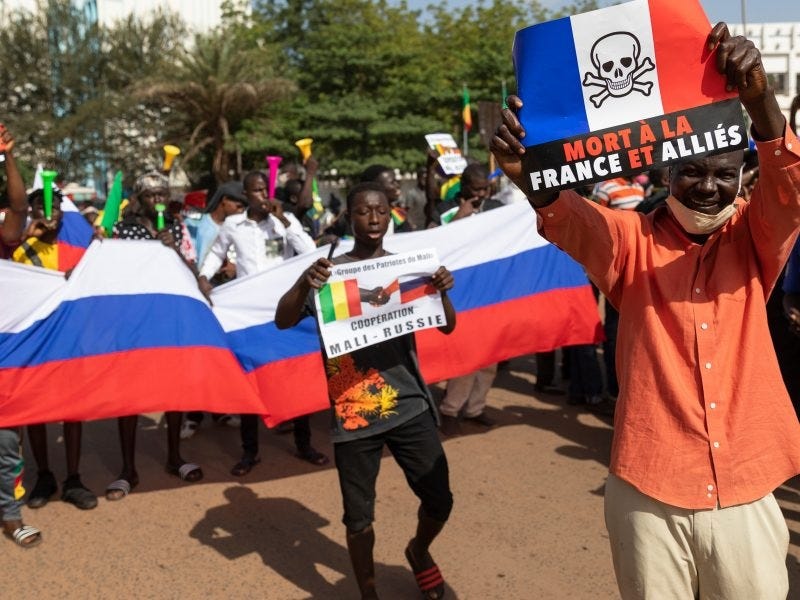Mali’s Banning Of All French-Funded NGOs Will Defend Its Democracy From Paris’ Meddling
The future of Mali has disproportionate significance in determining the contours of the New Cold War proxy struggle between the Golden Billion’s France and the Global South’s Russia in Africa. That country’s pioneering leadership appreciates its role in this grand strategic context and thus wisely moved to further defend their democracy by banning all French-funded NGOs. While that’ll reduce the likelihood of latent Color Revolution threats, it might also provoke Paris to double down on terrorism.
Mali’s transitional government just banned all French-funded NGOs as part of its latest “Democratic Security” move, the concept of which refers to the wide range of counter-Hybrid War tactics and strategies for defending national models of democracy from foreign threats. In this case, Bamako finally realized that those groups that are financially tied to its former colonizer are actually functioning as fifth columns for organizing a Color Revolution and training terrorists for waging Unconventional War.
Malian-French ties have deteriorated since anti-imperialist and multipolar-patriotic elements of that West African country’s armed forces assumed power last year, with this trend accelerating over the summer after its military leadership started robustly pushing back against all forms of neo-imperialism. By becoming regional pioneers in this respect, they triggered that declining hegemon’s wrath, which in turn sought to destabilize them by backing the same terrorist groups that Paris previously fought.
Macron got so upset over the past few months that he twice insulted Africans in very racist ways out of desperation to discredit that country’s transitional leadership, only to be put in his place by them in response. That further bolstered Mali’s anti-imperialist and multipolar-patriotic credentials, thus setting into motion the fast-moving comprehensive expansion of its strategic relations in Russia that culminated in Moscow extending it much-needed agricultural and “Democratic Security” support.
The de facto leader of the Global Revolutionary Movement (GRM) earlier pledged to help all of its African partners fully complete their decolonization processes, and since Mali is an African pioneer in this regard, it therefore follows that the Kremlin is eager to turn it into a positive example for all. To that end, their newfound relations aim not just to defend Mali’s democracy from all French-backed Hybrid War threats, but also to transform that country into a regional anti-imperialist beacon of influence.
Axios exposed France’s plans last month for pushing back against Russia in its former colonial “sphere of influence”, which relies heavily on gaslight-driven information warfare narratives alleging that Moscow and not Paris is supposedly the source of all Africans’ problems. That counterfactual and manipulative approach discredited France’s plans from the get-go and showed just how desperate it is to cling to its declining hegemony across the same continent where it used to exert unparalleled dominance.
Africa’s role in the New Cold War is regrettably shaping up to be battlefield between the US-led West’s Golden Billion of which France is a “junior partner” and the jointly BRICS- & SCO-led Global South where Russia exerts influential leadership, with these two de facto blocs clashing via proxy across the continent over the direction of the global systemic transition. The first-mentioned was to indefinitely delay the decline of unipolarity while the second wants to accelerate the evolution to multipolarity.
In pursuit of their respective objectives, France wants to retain its neo-imperial dominance over its former colonial “sphere of influence” whereas President Putin explained during his Valdai Club speech late last month that Russia wants to help all African countries comprehensively strengthen their sovereignty. Their increasingly tense competition in Mali already has all the trappings of a proxy war in progress, especially since this geostrategically positioned state is a regional trendsetter.
The collapse of its anti-imperialist and multipolar-patriotic transitional government in the face of France’s incipient Hybrid War of Terror against it could doom the rest of West Africa to languishing as de facto slaves for the indefinite future. By contrast, its Russian-assisted resistance would set a powerful example to its neighbors that could inspire those likeminded elements of their armed forces to follow its lead in liberating their people from Paris’ yoke like Burkina Faso’s seem poised to do.
The future of Mali therefore has disproportionate significance in determining the contours of the New Cold War proxy struggle between the Golden Billion’s France and the Global South’s Russia in Africa. That country’s pioneering leadership appreciates its role in this grand strategic context and thus wisely moved to further defend their democracy by banning all French-funded NGOs. While that’ll reduce the likelihood of latent Color Revolution threats, it might also provoke Paris to double down on terrorism.
Considering this, it would be premature to declare that Mali succeeded in liberating itself from France’s neo-colonial yoke with just that single move, though there’s no doubt that it just made a major leap in that direction. It’s expected that French-connected kinetic threats will soon multiply as Paris attempts to punish Bamoko for setting the regional precedent whereby other West African states might be inspired to follow suit by banning that declining hegemon’s NGO-disguised agents of Hybrid War influence too.
Looking forward, these predictable terrorist-driven threats will probably serve to further catalyze the comprehensive expansion of strategic relations with Russia with a focus on “Democratic Security” cooperation in all spheres. That’ll in turn prompt France to prioritize its gaslight-driven information warfare operations against those two together with doubling down on training more terrorists, thus likely setting the stage for major New Cold War proxy struggle in West Africa sooner than later.




